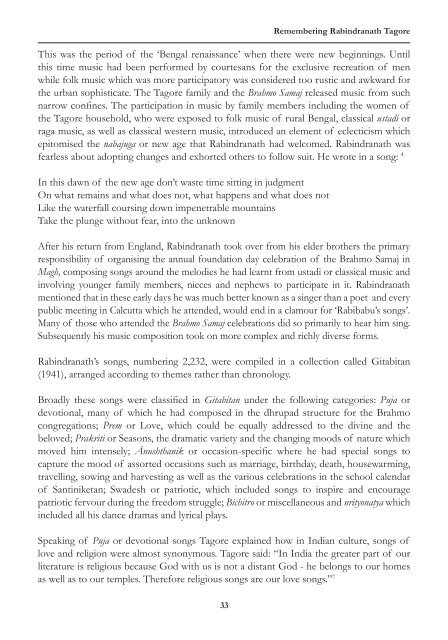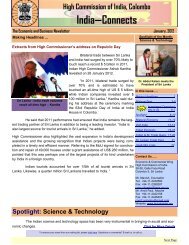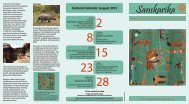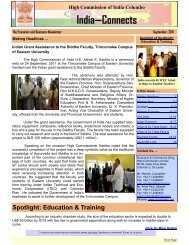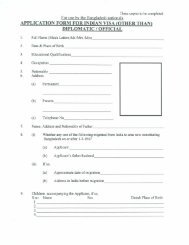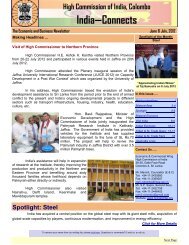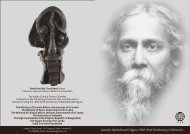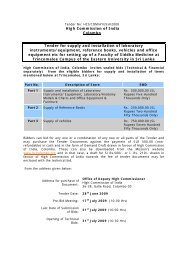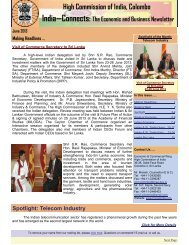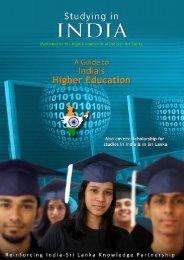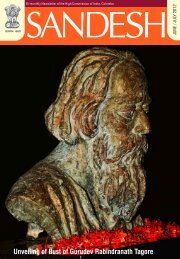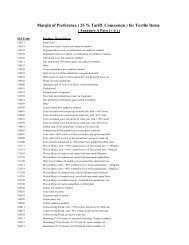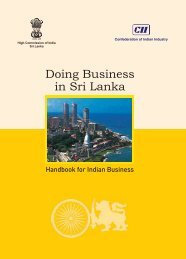Remembering Rabindranath Tagore Volume - High Commission of ...
Remembering Rabindranath Tagore Volume - High Commission of ...
Remembering Rabindranath Tagore Volume - High Commission of ...
You also want an ePaper? Increase the reach of your titles
YUMPU automatically turns print PDFs into web optimized ePapers that Google loves.
33<br />
<strong>Remembering</strong> <strong>Rabindranath</strong> <strong>Tagore</strong><br />
This was the period <strong>of</strong> the ‘Bengal renaissance’ when there were new beginnings. Until<br />
this time music had been performed by courtesans for the exclusive recreation <strong>of</strong> men<br />
while folk music which was more participatory was considered too rustic and awkward for<br />
the urban sophisticate. The <strong>Tagore</strong> family and the Brahmo Samaj released music from such<br />
narrow confines. The participation in music by family members including the women <strong>of</strong><br />
the <strong>Tagore</strong> household, who were exposed to folk music <strong>of</strong> rural Bengal, classical ustadi or<br />
raga music, as well as classical western music, introduced an element <strong>of</strong> eclecticism which<br />
epitomised the nabajuga or new age that <strong>Rabindranath</strong> had welcomed. <strong>Rabindranath</strong> was<br />
fearless about adopting changes and exhorted others to follow suit. He wrote in a song: 4<br />
In this dawn <strong>of</strong> the new age don’t waste time sitting in judgment<br />
On what remains and what does not, what happens and what does not<br />
Like the waterfall coursing down impenetrable mountains<br />
Take the plunge without fear, into the unknown<br />
After his return from England, <strong>Rabindranath</strong> took over from his elder brothers the primary<br />
responsibility <strong>of</strong> organising the annual foundation day celebration <strong>of</strong> the Brahmo Samaj in<br />
Magh, composing songs around the melodies he had learnt from ustadi or classical music and<br />
involving younger family members, nieces and nephews to participate in it. <strong>Rabindranath</strong><br />
mentioned that in these early days he was much better known as a singer than a poet and every<br />
public meeting in Calcutta which he attended, would end in a clamour for ‘Rabibabu’s songs’.<br />
Many <strong>of</strong> those who attended the Brahmo Samaj celebrations did so primarily to hear him sing.<br />
Subsequently his music composition took on more complex and richly diverse forms.<br />
<strong>Rabindranath</strong>’s songs, numbering 2,232, were compiled in a collection called Gitabitan<br />
(1941), arranged according to themes rather than chronology.<br />
Broadly these songs were classified in Gitabitan under the following categories: Puja or<br />
devotional, many <strong>of</strong> which he had composed in the dhrupad structure for the Brahmo<br />
congregations; Prem or Love, which could be equally addressed to the divine and the<br />
beloved; Prakriti or Seasons, the dramatic variety and the changing moods <strong>of</strong> nature which<br />
moved him intensely; Ānushthanik or occasion-specific where he had special songs to<br />
capture the mood <strong>of</strong> assorted occasions such as marriage, birthday, death, housewarming,<br />
travelling, sowing and harvesting as well as the various celebrations in the school calendar<br />
<strong>of</strong> Santiniketan; Swadesh or patriotic, which included songs to inspire and encourage<br />
patriotic fervour during the freedom struggle; Bichitro or miscellaneous and nrityonatya which<br />
included all his dance dramas and lyrical plays.<br />
Speaking <strong>of</strong> Puja or devotional songs <strong>Tagore</strong> explained how in Indian culture, songs <strong>of</strong><br />
love and religion were almost synonymous. <strong>Tagore</strong> said: “In India the greater part <strong>of</strong> our<br />
literature is religious because God with us is not a distant God - he belongs to our homes<br />
as well as to our temples. Therefore religious songs are our love songs.” 7


